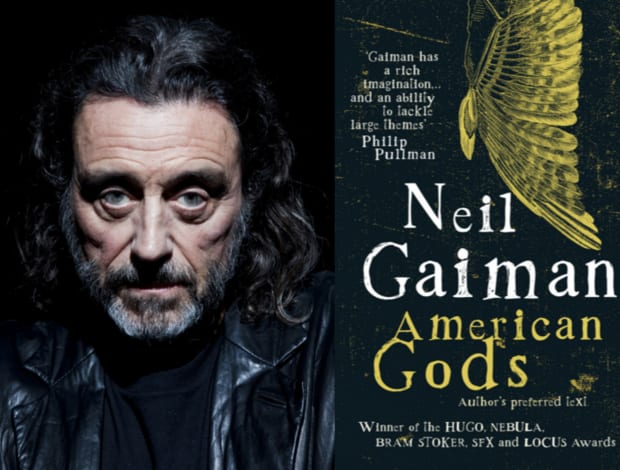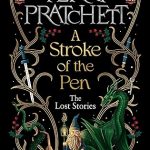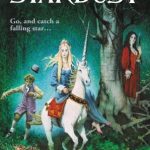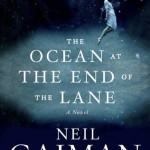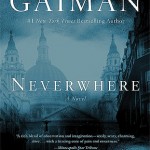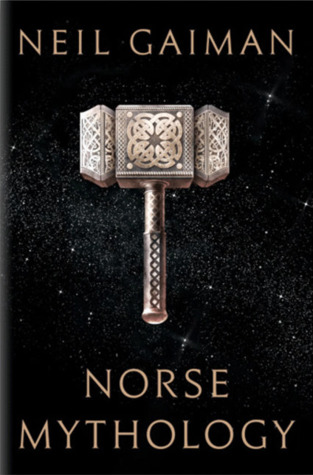 Norse Mythology by Neil Gaiman
Norse Mythology by Neil Gaiman Formats available: hardcover, paperback, ebook, audiobook
Pages: 293
Published by W. W. Norton & Company on February 7th 2017
Purchasing Info: Author's Website, Publisher's Website, Amazon, Barnes & Noble, Kobo, Bookshop.org
Goodreads
Introducing an instant classic—master storyteller Neil Gaiman presents a dazzling version of the great Norse myths.
Neil Gaiman has long been inspired by ancient mythology in creating the fantastical realms of his fiction. Now he turns his attention back to the source, presenting a bravura rendition of the great northern tales.
In Norse Mythology, Gaiman stays true to the myths in envisioning the major Norse pantheon: Odin, the highest of the high, wise, daring, and cunning; Thor, Odin’s son, incredibly strong yet not the wisest of gods; and Loki, son of a giant, blood brother to Odin and a trickster and unsurpassable manipulator.
Gaiman fashions these primeval stories into a novelistic arc that begins with the genesis of the legendary nine worlds and delves into the exploits of deities, dwarfs, and giants. Once, when Thor’s hammer is stolen, Thor must disguise himself as a woman, difficult with his beard and huge appetite, to steal it back. More poignant is the tale in which the blood of Kvasir, the most sagacious of gods, is turned into a mead that infuses drinkers with poetry. The work culminates in Ragnarok, the twilight of the gods and rebirth of a new time and people.
Through Gaiman’s deft and witty prose emerge these gods with their fiercely competitive natures, their susceptibility to being duped and to duping others, and their tendency to let passion ignite their actions, making these long-ago myths breathe pungent life again.
My Review:
Neil Gaiman’s retelling of the Norse myths should be required reading for anyone whose primary visions of Odin, Thor and Loki, derived primarily from Marvel Comics and the Marvel Cinematic Universe, just as the author’s once were.
Thor wasn’t half that bright, and Loki wasn’t nearly so handsome, although he was every bit as tricksy, and as compelling.
On the one hand, these stories of ancient gods from a world long gone seem like they might have little relevance for the 21st century. At the same time, there’s Marvel Comics, which mined these myths for pure gold. As has every fantasy writer of the 20th and 21st centuries, from J.R.R. Tolkien to Neil Gaiman himself.
These are the stories on which so much of modern literature (and TV and movies) are based, along with opera and many other forms of storytelling. These are the stories behind the stories.
Or at least what’s left of them. What we have, what the author has here to work with, are the written records of what was an oral tradition – stories told around the fire during the very long nights of almost endless winter, passed from skald to skald and mouth to ear, until they were finally compiled into the Prose Edda and the Poetic Edda in the 13th century, long after the Viking Age whose tales they tell.
At least in this rendition, what we have is a loose connection of short stories, that the author has strung together, like pearls on a string, into an episodic narrative from the beginnings of Yggdrasil to the end at Ragnarok.
And while they no longer invoke the awe that they once did, the Norse gods are still fantastic.
Escape Rating B+: This collection, or retelling, or reintroduction to the Norse myths should become a classic, right alongside Edith Hamilton’s Mythology. It makes what often seemed like a conflicting collection of tales into a somewhat coherent whole, admittedly a whole like a slice of Swiss cheese, where some parts are missing, deliberately or otherwise.
But readers looking for Neil Gaiman’s particular voice in this collection will only find hints and snippets of it. These aren’t his stories, and that shows. But they are, undoubtedly, the inspiration for many of his best.
If you read American Gods and instantly recognized Mr. Wednesday, then you have already been exposed to these foundational tales, but this version is still definitely worth a read. If you didn’t see through Mr. Wednesday’s rather thin disguise, then you need to read this book before you dive into the upcoming series.
